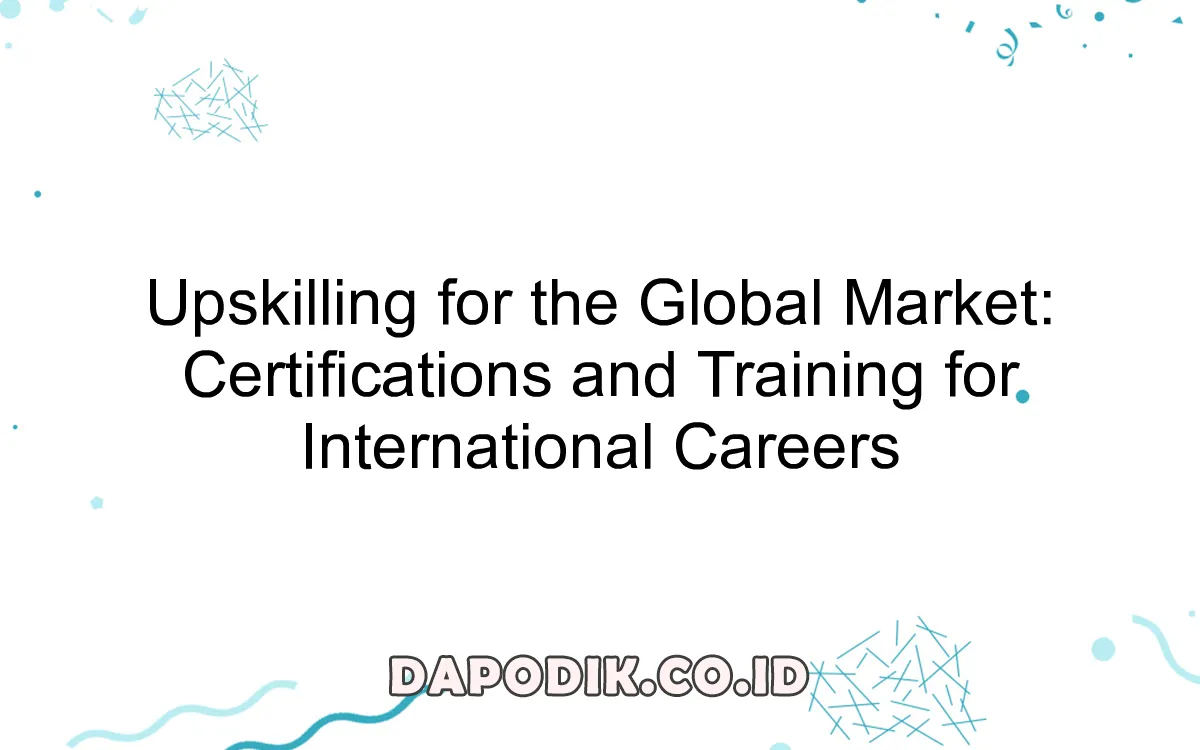Upskilling for the Global Market: Certifications and Training for International Careers
With the ongoing globalization, upskilling has become crucial for individuals seeking international careers. In this article, we will explore the significance of certifications and training in preparing professionals for the global market.
Identifying in-demand skills for international jobs
In today’s global market, having the right skills can greatly boost your chances of landing a job abroad. As companies expand their operations internationally, they seek employees with specific competencies that can adapt to diverse cultural and business environments. Here are some key skills that are in-demand for international careers:
1. Language Proficiency
Proficiency in multiple languages is highly valued in international job roles. Being able to communicate effectively in the local language of the country you are working in can open doors and enhance your understanding of the local culture. Language skills also enable you to build relationships with colleagues and clients from different backgrounds.
2. Cross-Cultural Competence
Working in different countries often means collaborating with people from various cultural backgrounds. Cross-cultural competence involves having an awareness and understanding of different cultural norms, customs, and communication styles. This skill allows you to navigate cultural differences and work effectively in diverse teams.
3. Adaptability and Flexibility
International careers require individuals who can quickly adapt to new environments and thrive in challenging situations. Employers value candidates who demonstrate flexibility and the ability to embrace change. Being adaptable allows you to navigate different work cultures, handle unexpected situations, and easily adjust to shifting priorities.
4. Global Mindset
Having a global mindset means having a broad understanding of global trends, economies, and markets. It involves staying updated on international news, embracing diversity, and thinking beyond national boundaries. A global mindset allows individuals to analyze situations from a global perspective, which is crucial for making sound business decisions in international contexts.
5. Technical Skills
Technical skills specific to your field of expertise are also important when pursuing international careers. These skills may vary depending on the industry, but having a strong foundation in your area of specialization is essential. Staying updated with the latest trends and acquiring relevant certifications can make you a valuable asset to employers in global positions.
Exploring Global Certification Programs
In today’s dynamic global job market, upskilling has become essential for professionals seeking successful international careers. One effective way to stand out and enhance your skill set is by obtaining certifications from recognized global certification programs. These programs offer specialized training and credentials that can significantly boost your career prospects and open doors to exciting opportunities worldwide.
Advantages of Global Certification Programs:
- Recognition: Global certification programs are widely recognized and respected within their respective industries. The certifications act as proof of your expertise and competence, making you a desirable candidate for employers worldwide.
- Industry Relevance: These programs are designed to meet the current demands and trends in global industries. By obtaining certifications, you can demonstrate your proficiency in the latest tools, technologies, and best practices.
- International Networking: Participating in global certification programs allows you to connect with professionals from around the world. These networks provide valuable opportunities for collaboration, knowledge-sharing, and career growth.
- Career Advancement: Global certifications can open doors to higher-level positions, promotions, and salary increases. Employers often prioritize candidates with specialized certifications, as they indicate a commitment to continuous learning and professional development.
Choosing the Right Global Certification Program:
With numerous options available, it’s crucial to choose a global certification program that aligns with your career goals and industry requirements. Consider factors such as:
- Industry recognition and reputation of the certification program.
- Curriculum relevance and alignment with the skills you aim to develop.
- Delivery format (online, classroom, blended) that suits your learning style and schedule.
- Support resources, such as study materials, practice exams, and access to subject matter experts.
- Cost and return on investment (ROI) in terms of enhanced career prospects.
Conclusion:
Investing in global certification programs can significantly enhance your professional profile and prepare you for success in the global job market. By gaining specialized knowledge and skills, you increase your value as a candidate for international career opportunities. Make sure to choose the right certification program that aligns with your goals to maximize the benefits and propel your career forward.
Conclusion
Obtaining certifications and relevant training is crucial for individuals aiming to thrive in the global job market. These credentials provide the necessary skills and knowledge needed to compete on an international level, increasing the chances of securing lucrative careers abroad. Investing in upskilling not only enhances one’s employability but also opens doors to diverse opportunities and global networking connections.

Posting Komentar untuk "Upskilling for the Global Market: Certifications and Training for International Careers"
Gambar ataupun video yang ada di situs ini terkadang berasal dari berbagai sumber media lain. Hak Cipta sepenuhnya dipegang oleh sumber tersebut.